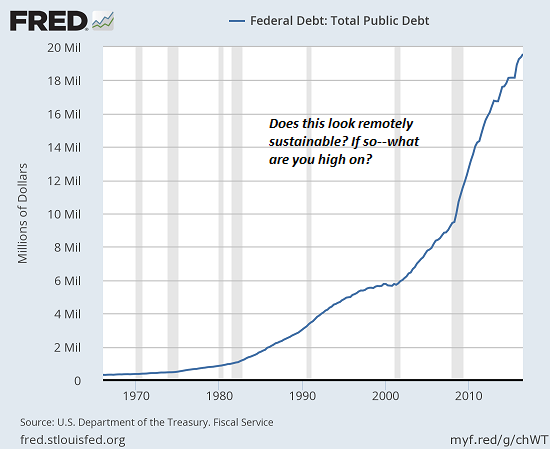When Money Is “Free,” Discipline Evaporates; When Discipline Evaporates, Decisions Are Disastrous
Whatever is free is squandered. When water is free, it’s freely wasted. When electricity is free, there’s no motivation to use it wisely.
The same principle holds true for money. If money is free, or nearly free, there is no motivation to invest it wisely, or consider the opportunity costs of spending it versus investing it or preserving it as savings.
Money that can be borrowed for next to nothing is essentially “free” because the costs of interest are negligible. Money that can be borrowed in virtually unlimited quantities is also “free,” as whatever funds are squandered or lost to malinvestment can be easily replaced with more borrowed money.
Nothing enduringly productive can be built without discipline and a steady focus on the bottom line of production costs, revenues, overhead expenses and opportunity costs, i.e. what else could have been done with this capital and labor?
These dynamics are scale-invariant, meaning they apply to individuals and households as well as to companies, institutions and nation-states.
Thus we see the same poor results in trust-funders whose income is “free” (pouring in monthly whether the individual was productive or not) and national governments that can simply borrow another trillion dollars (or $10 trillion, hey why not?) when they’ve squandered all the tax revenues.
We intuitively grasp the necessity of discipline to corral impulses and desires that are self-destructive in the longer term. Eating chocolate cake and ice cream might appeal to our immediate cravings, but longer term the consequences of unbridled consumption of this kind of sweets are dire.
We also grasp the role discipline plays in learning difficult subjects/tasks and in accomplishing long-term, often arduous projects.
If there is any commonality to genius, it is a prodigious work ethic based on a highly disciplined schedule of daily productive effort.
All of which leads us to ask: what precisely have we accomplished by borrowing and blowing $9 trillion in additional national debt over the past eight years?With interest rates near-zero and the credit line of the nation essentially unlimited–recall that the central bank created $3.5 trillion of money out of thin air and used much of it to buy federal bonds–there was no need for any difficult choices or trade-offs–that is, discipline.
The trillions could be borrowed from future taxpayers painlessly, and squandered on propping up unaffordable entitlements and programs that were each immune to discipline.
So a pharmaceutical company raises the cost of a pinworm medication from $3 to $600. When money can be borrowed in endless quantities for “free,” there’s no need to ask if this predatory piracy is justified or necessary for the good of the nation; just borrow another trillion to pay for Medicare and Medicaid costs that are largely skims, scams, fraud or unproductive paper-shuffling.
As long as the money spigot is “free,” there’s no need to ask why the F-35 fighter aircraft is four times as costly as the aircraft it replaces.
As long as the money is “free,” why should any politico risk telling a National Security agency such as the CIA “no more money for your agency until you can account for the tens of billions you’re spending on gosh knows what.”
Lowering interest rates to near-zero has reduced the need for fiscal-political discipline to near-zero. Politicos of all stripes are only too willing to borrow trillions from future generations–why not borrow and blow the money now to assure my re-election, and let future taxpayers figure out what to do about the crushing burden of debt we’re leaving them?
High interest rates were basically the only mechanism of discipline imposed on short-term, free-spending politicos. Once the cost of interest was reduced to signal noise, politicos were freed of the burdens of discipline: of having to reckon the burdens of future interest, of opportunity costs, of trade-offs and the difference between productive investments and cronyist pork-barrel spending on marginal (but highly profitable) “infrastructure.”
How disciplined will your gambling be in the casino when all your losses are covered by future taxpayers? Why hold back from risky gambles when any losses will be paid by others? Go head and gamble wildly–any lucky wins will be yours to keep, and all the losses will be covered by nameless others.
This is how “free money” leads to disastrous decisions. With the need for discipline eliminated, there’s no motivation not to gamble wildly, fund every special interest group’s demand, and grease the palms of every insider, every crony and every oligarch.
This is how a great nation will self-destruct. The only possible output of a system lacking any discipline is self-destruction.

If you found value in this content, please join me in seeking solutions by becoming a $1/month patron of my work via patreon.com.
Check out both of my new books, Inequality and the Collapse of Privilege ($3.95 Kindle, $8.95 print) and Why Our Status Quo Failed and Is Beyond Reform ($3.95 Kindle, $8.95 print). For more, please visit the OTM essentials website.
Leave a Reply